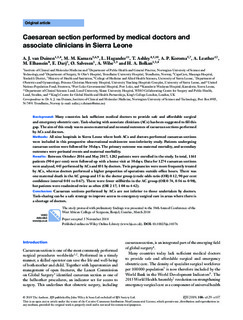Caesarean section performed by medical doctors and associate clinicians in Sierra Leone
van Duinen, Aalke Johan; Kamara, Michael M.; Hagander, Lars; Ashley, Thomas; Koroma, Alimamy Philip; Leather, Andy J.M.; Elhassein, Mohammed; Darj, Elisabeth; Salvesen, Øyvind; Wibe, Arne; Bolkan, Håkon Angell
Journal article, Peer reviewed
Published version

Åpne
Permanent lenke
http://hdl.handle.net/11250/2639057Utgivelsesdato
2019Metadata
Vis full innførselSamlinger
Sammendrag
Background
Many countries lack sufficient medical doctors to provide safe and affordable surgical and emergency obstetric care. Task‐sharing with associate clinicians (ACs) has been suggested to fill this gap. The aim of this study was to assess maternal and neonatal outcomes of caesarean sections performed by ACs and doctors.
Methods
All nine hospitals in Sierra Leone where both ACs and doctors performed caesarean sections were included in this prospective observational multicentre non‐inferiority study. Patients undergoing caesarean section were followed for 30 days. The primary outcome was maternal mortality, and secondary outcomes were perinatal events and maternal morbidity.
Results
Between October 2016 and May 2017, 1282 patients were enrolled in the study. In total, 1161 patients (90·6 per cent) were followed up with a home visit at 30 days. Data for 1274 caesarean sections were analysed, 443 performed by ACs and 831 by doctors. Twin pregnancies were more frequently treated by ACs, whereas doctors performed a higher proportion of operations outside office hours. There was one maternal death in the AC group and 15 in the doctor group (crude odds ratio (OR) 0·12, 90 per cent confidence interval 0·01 to 0·67). There were fewer stillbirths in the AC group (OR 0·74, 0·56 to 0·98), but patients were readmitted twice as often (OR 2·17, 1·08 to 4·42).
Conclusion
Caesarean sections performed by ACs are not inferior to those undertaken by doctors. Task‐sharing can be a safe strategy to improve access to emergency surgical care in areas where there is a shortage of doctors.
